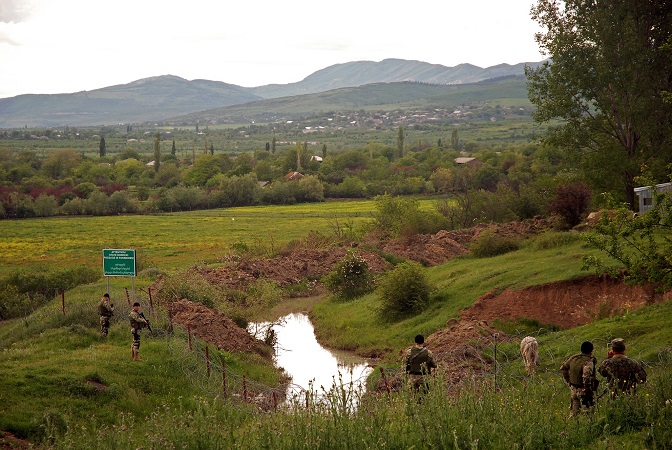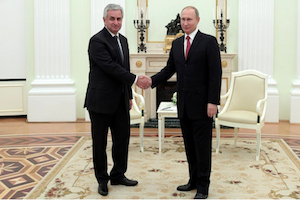De Facto Government of South Ossetia Paralyzed Amid Severe Crisis
By Tomáš Baranec
December 21, 2023
In 2022, the opposition-minded part of the South Ossetian population received the victory of Alan Gagloyev in de facto presidential elections with a mix of hope and uncertainty. Although Gagloyev was an opposition candidate against the increasingly unpopular de facto President Anatoly Bibilov, he was not the first or second choice for most of the voters. Bibilov indirectly paved Gagloyev’s path to power after local authorities did not allow other popular opposition leaders to run. Today Gagloyev’s administration, paralyzed by the interests of influential grey eminences, is paving the way for Bibilov’s return to power amid a deep crisis. Gagloyev’s end might come already in 2024, following the planned parliamentary elections.

South Ossetian Territorial Claims Overlap With "Fear Zones" Already Controlled by Russian Forces
By Tomáš Baranec, Giorgi Bilanishvili, Davit Katsarava, Lana Ghvinjilia
March 1, 2022, the CACI Analyst
On November 19, 2021, the South Ossetian de-facto State Commission for the Border with Georgia published its work, concluding that de facto South Ossetia had lost about 200 square kilometers to Georgia. This statement fueled a political crisis in the separatist region as local opposition sought to impeach de-facto president Anatoly Bibilov. Most experts studying these developments focus on their domestic roots and impacts. However, analysis of the Commission’s territorial claims in the context of the continuous borderization of the Georgian-Ossetian Administrative Boundary Line (ABL) and the creeping annexation of Georgian territory by Russian forces also indicates another possible dimension of this development: coordination between Tskhinvali and the Kremlin to annex stripes of land with military-strategic importance.

Tensions Remain around Georgia's Breakaway Regions Nine Years After Five-Day War
By Natalia Konarzewska
October 26, 2017, the CACI Analyst
In August, Georgia commemorated the ninth anniversary of its five-day war with Russia over the breakaway regions of Abkhazia and South Ossetia and the 25th anniversary of the war in Abkhazia. Although years have passed since the hostilities, the conflicts remain unresolved while the political situation around the two de facto entities as well as Russia-Georgia relations remain tense. Russia’s President Vladimir Putin visited Abkhazia and reiterated Russia’s military support for the region. In the preceding months, Russia increased its military pressure on Georgia by conducting large-scale military exercises in South Ossetia and Abkhazia. In parallel, Russia continues the illegal demarcation of the so-called frontier between Georgian-controlled territory and the separatist regions, moving the occupation line further into Georgian territory.

EU–China trade to bolster security in the South Caucasus
By Boris Ajeganov
January 23, 2017, the CACI Analyst
Foreign investment in Georgia is strengthening the country’s importance in connecting East Asia with Europe, which has positive implications for the broader region. The rise in FDI in commercial and transportation infrastructure in combination with the signing of international free trade agreements will reduce Georgia’s vulnerability in terms of economic and, ultimately, ‘hard’ security. The growing importance of the South Caucasus as node for EU-China trade will weaken Russia’s incentives to undermine its southern neighbors by military, political, and economic means as it has done in the past. Accordingly, Tbilisi’s ability to conduct an independent foreign policy is set to improve despite the absence of Western security guarantees.
Advancing Georgian-U.S. security cooperation after the Trump transition
By Richard Weitz
January 19th 2017, the CACI Analyst
The Trump administration will soon undertake a comprehensive review of Russia-US relations and U.S. policy toward the rest of Eurasia. Although the new team will presumably consider many options, the president-elect’s statements imply that the U.S. will not soon support further NATO expansion or other actions that would strongly antagonize Moscow. Despite this limitation, the U.S. government will continue security ties with U.S. partners in Eurasia, such as Georgia. In practice, there are a number of steps the U.S. and Georgia can undertake to advance their mutual security.





